In the tropical, war-torn Democratic Republic of Congo (DRC), the social disruption of violent conflict increases child mortality, in part because of decreased access to healthcare. Malaria is the top cause.
Worldwide, the DRC has also been ranked one of the least feasible countries for malaria elimination. Malaria ecology is deeply rooted, and healthcare and education infrastructure are heavily damaged by extended military conflict.
Amidst this bleak outlook, maternal education is being recognized as a critical preventative measure, with up to a 53 percent reduction in their children’s malaria rates with an education beyond the primary level. This is an effect similar in magnitude to that shown in clinical trials of the leading biomedical malaria vaccine, which demonstrated 30 percent efficacy.
Dr. Michael Hawkes and his team of researchers at the University of Alberta are calling it a social vaccine: an intervention that addresses a social inequity that could otherwise lead to a public health problem.
While other factors are also at play, maternal education is an important factor – even more so than wealth. In countries with high rates of malaria transmission like the DRC, basic education covers the value of preventative measures like sleeping under mosquito netting. Hawkes found a clear trend in the increased use of bed nets with increased maternal education.
The curriculum also includes the importance of seeking medical care when malaria symptoms arise in children, like fevers.
Educated mothers are also more likely to have fewer children born further apart, and better social connections that improve their access to information and healthcare.
The researchers, however, are quick to recognize the continued importance of medical vaccines, as sudden displacement continues to threaten stable access to shelter, belongings, and medicine. But malaria is just one benefit amongst the many profound changes that education could bring to women and communities.








































